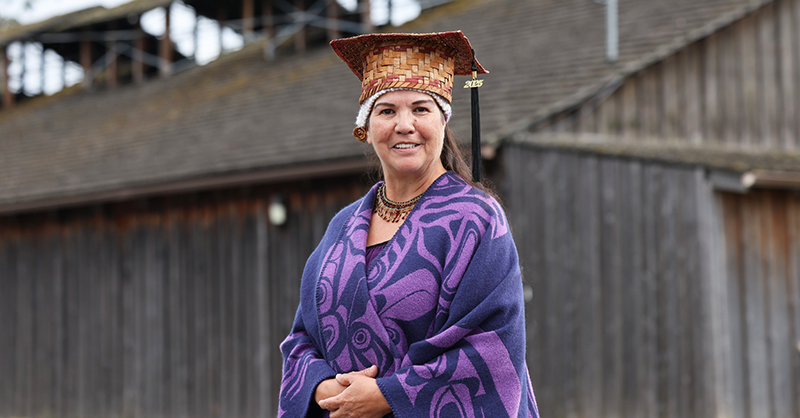
By Micheal Rios, Tulalip News
On Thursday, June 26, the latest iteration of Tulalip’s Higher Education grad banquet was hosted at a fancified Gregg Williams Court. Thirty college graduates were celebrated for achieving a monumental milestone and invited to attend a banquet in their honor, surrounded by community supporters on their ancestral homelands.
Recently elected Board of Director Deb Parker served as event emcee. “My hands go up to each and every one of you here to support our graduates. As I was sitting here reflecting, I couldn’t help but think of when I graduated Marysville Pilchuck High School many, many years ago, and was only 1 of 5 tribal members pursuing higher education. If you think of how far we’ve come as a Tribe since then, to now having so many tribal members attending colleges all across the country, and even a couple outside of the country, it’s actually quite remarkable. You all, our graduates, are remarkable.
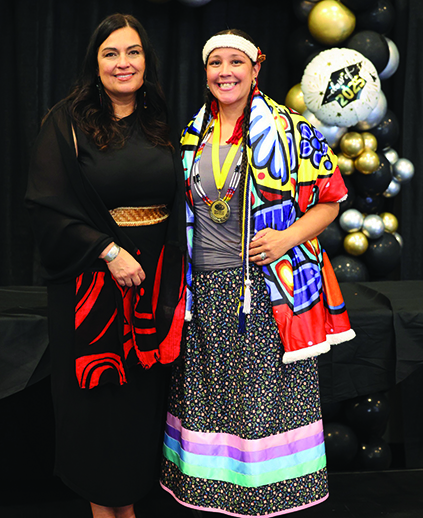
“When I was attending the University of Washington, my elder Ray Moses told me, ‘We are so proud of you. Keep doing the best that you can, and when you’re finished getting your education, you come back and serve your Tribe’,” continued Deb. “I now have the honor of serving my Tribe as a Board of Director and sharing that same message with all of you. We need your education and your skills to take us into the future. Like our ancestors who laid the foundation for us to walk today, we need you to continue striving for and building new pathways so future generations can run and even soar.”
Deb’s opening remarks were met with a rousing ovation from college grads and community supporters who share the late, great Ray Moses vision for putting education to service for our Tribe. Routinely, attending banquet graduates echoed their appreciation for all Tulalip has done for them, including the significant financial assistance for tuition, housing, and life expenses that afforded many the opportunity to pursue their higher education dreams. They also echoed an intent desire to now return home and join the Tulalip workforce.
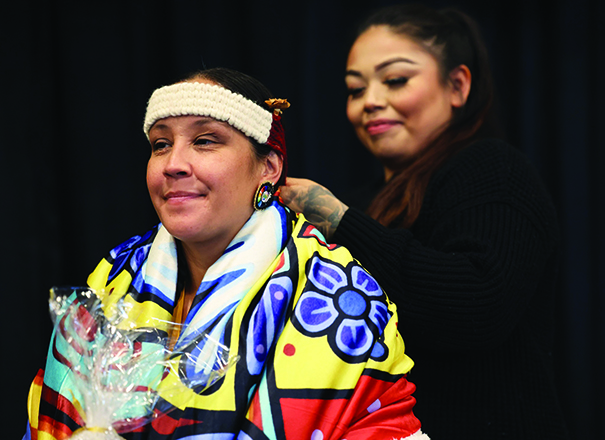
Student speaker Dinesha Kane just recently returned from Georgia, where she played golf on the collegiate stage while earning her Bachelor of Business Management degree from Northwest Indian College.
“In just one year, I completed my Associate’s and Bachelor’s degrees while carrying a course load that many called impossible at two colleges,” stated Dinesha from the podium. “I did this while raising my two incredible sons – Brodie, my oldest, and Braiden, my youngest – who inspire me every single day with their laughter, their brilliance, and their love. I did this with the unwavering support of my husband JT, who never let me forget my power, even in the moments when I doubted it myself.
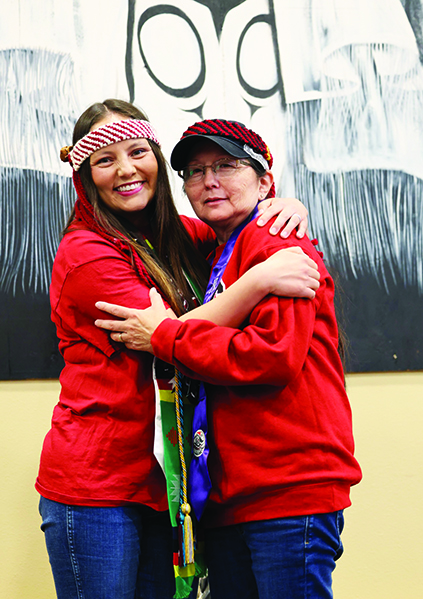
“Every class I took, every page I turned, every paper I wrote—I did it for them. For my family. For my community. For every young Indigenous student who has ever wondered if they belong in these spaces. I am here to say—you do. We do. We always have.
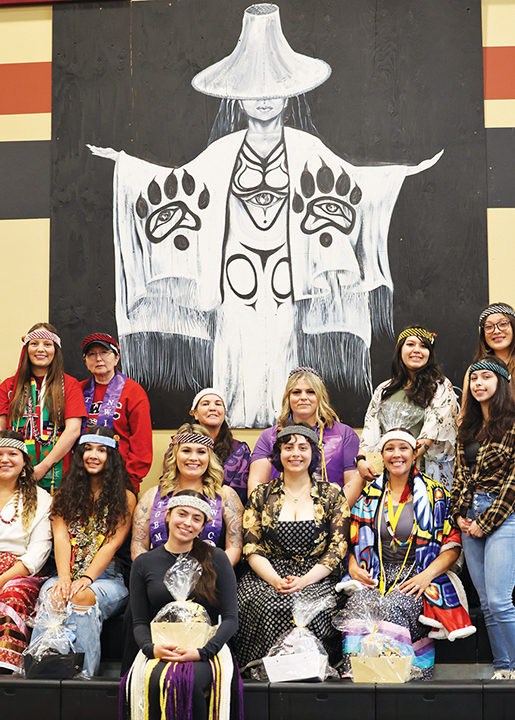
“And if there’s one thing I’ve learned through all of this, it’s this: Don’t be afraid to fall. Don’t be afraid to make mistakes, to stumble, to not have it all figured out. Fall—and then get back up. And if you fall again? Get up again. Every setback, every misstep, every late night filled with doubt and tears—it’s all part of becoming. Growth doesn’t happen in comfort zones. Strength doesn’t come from things being easy. It comes from rising every time life tries to knock you down. Keep trying. Keep showing up. That’s how we win.”
Awarded highest honors valedictorian, Dineshia is hopeful she’ll be able to put everything she’s learned into benefitting Tulalip’s youth as a sports psychologist. We wish her nothing but the best in her future endeavors.
Meanwhile, fellow student speaker James Whitebear has already carved out quite the roll for himself in his Tribe. After graduating high school in 2010, he soon joined Tulalip’s working class. Fourteen years later, James thrives in his role as Category Coordinator for Tulalip Tribal Federal Corporation, where he specializes in marketing and category management. Along the way he made a promise to his mom that he’d go to college and get a degree. After his mom passed in 2019, James made it a priority to fulfill that promise.
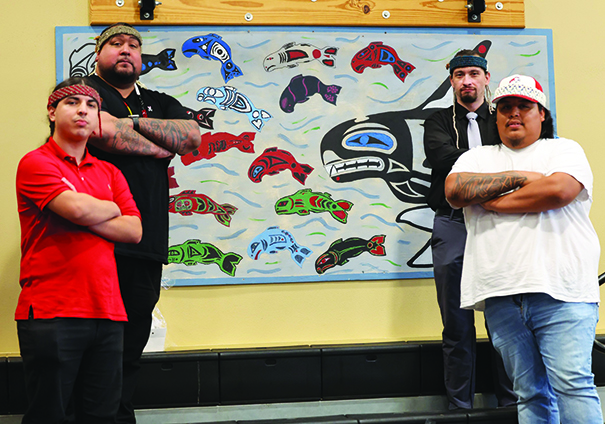
“She may not be here today to see this moment, but every single step that I took, every single assignment I completed, my mom was there with me, guiding me and seeing me through the process,” James shared. “Now, I’m here sharing in this sacred moment with all my fellow graduates. So whether you earned an A.A., a B.A., a Master’s or Ph.D., we are not defined simply by those letters next to our name, but by the legacy we are striving to build for generations to come.
“Make no mistake, this academic journey was not just for you or your immediate family. You carry your great-grandmothers and great-grandfathers who weren’t allowed to speak their language or practice their culture. You carry great-uncles and great-aunties who couldn’t leave the Reservation or get a job because they were too Indian. You honor all those who walked before us by telling your story today, loudly and proudly, and by refusing to be silenced.
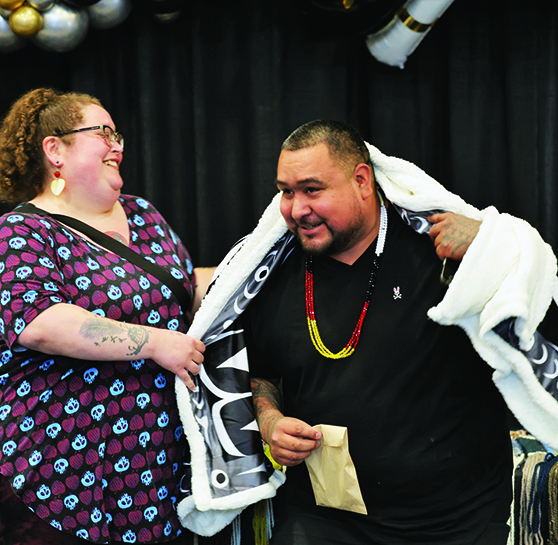
“Now, some of you may wonder what’s next after graduation and what do to with your degrees,” James addressed. “The answer is simple. Now, we build. Now, we teach. And, now, we lead. We need you to return home to Tulalip with open hearts and open minds, for our youth and our shared future.”
The wisdom in Ray Moses’ vision for his people to go to college, get all the education they can, and then bring it back in service of their Tribe, is a call to action that this most recent crop of higher education graduates is committed to answering.
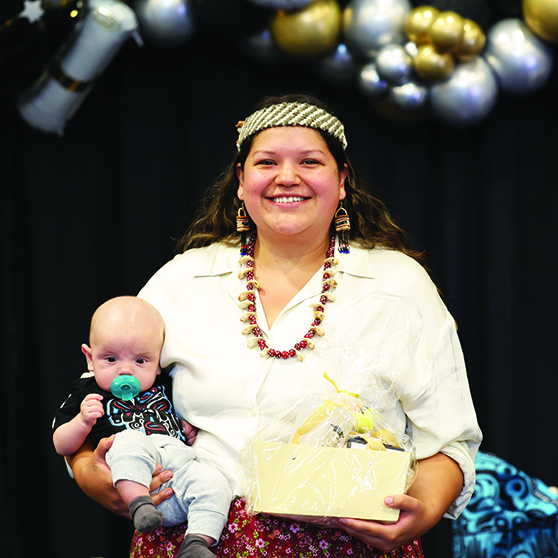
If you feel empowered to also answer the call, please contact Higher Education at (360) 716-4888 or email highereducation@tulaliptribes-nsn.gov Tulalip’s Higher Ed staff are eager to help new and returning students find their path to academic success. They can assist with FAFSA applications and finding scholarship opportunities, as well as simply reviewing the Tribe’s current policies regarding paying for college and other educational programs.